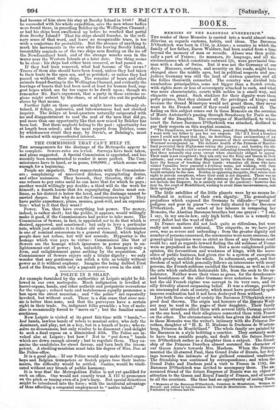THE COMMISSION THAT CAN'T HELP IT.
THE arrangements for the drainage of the Metropolis appear to be complete. Sewers-rates are levied. Surveys have been taken, -and plans suggested. A Special Commission is appointed, and has recently been reconstructed to render it more perfect. The Com- missioners have in hand, or in posse, 180,0001.; which seems well enough for a beginning.
People are impatient. They remonstrate with the Commission- era; complaining of uncovered ditches, regurgitating drains, and other nuisances. They beseech, they threaten, they offer : one refuses to pay rates until he can have that for which he pays ; another would willingly pay double; a third will do the work for himself; a fourth learns that his regurgitating drains must con- tinue, as his district is below the level, and the drainage cannot be carried deeper. But why do not the Commissioners begin ? They have public expectancy, plans, monies, good-will, and an organiza- tion: what is it that they want? Power. Yes, they have everything but power. The money, indeed, is rather short ; but the public, it appears, would willingly make it good, if the Commissioners had power to take more. The Commission of Sewers, in fact, is appointed not to do that which is desired, approved, and sanctioned ; but only to levy a particular rate, which just enables it to tinker old sewers. The Commission is one of nominal concessions to a general demand, which higher
pie dare not refuse, but will not concede. Hypocrisy is the mage which vice pays to virtue : Commissions like that of Sewers are the homage which ignorance in power pays to en- lightenment out of power; but, unluckily, the homage is only a form, and enlightenment gains nothing by the acquisition. A. Commissioner of Sewers enjoys only a titular dignity : we only wonder that any gentleman can relish a title as totally without power as it is without euphony. Imagine the being dubbed First Lord of the Drains, with only a pageant power even in the sink !
I I I


























 Previous page
Previous page